The essential features of hotel software for optimal management—such as reservation systems, revenue management, customer relationship management, and integration capabilities—collectively enhance operational efficiency and guest satisfaction. These features not only streamline processes but also improve pricing strategies and foster personalized guest experiences. Ultimately, they drive increased revenue and loyalty within the hospitality sector. By implementing these systems, hotel and restaurant owners can address their operational challenges effectively.
In the fast-evolving landscape of hospitality, the right hotel software serves as a pivotal element in unlocking operational excellence and maximizing revenue. As establishments strive to enhance guest experiences while navigating complex management tasks, comprehending the essential features of hotel software becomes paramount.
What specific tools and functionalities can truly transform a hotel’s operations and elevate guest satisfaction? This article explores ten indispensable features of hotel management software, revealing how they empower hotels to thrive in a competitive market and meet the ever-changing expectations of modern travelers.
Lights On offers an extensive array of digital marketing and income optimization services tailored specifically for the hospitality sector. Their offerings encompass website and content management, performance marketing, social media coordination, search engine marketing, and website design. Moreover, they emphasize advanced income management strategies, including pricing optimization, demand generation, and market trend analysis. This holistic approach not only enhances customer engagement but also significantly boosts revenue streams for hotels and dining establishments through the implementation of hotel software.
Successful case studies underscore the effectiveness of Lights On's strategies. For instance, accommodations that implemented dynamic pricing and upselling techniques reported a notable increase in additional income and guest loyalty. Properties employing these advanced income optimization methods with hotel software are projected to achieve improved performance metrics, with direct bookings expected to rise as they enhance their online visibility and marketing efforts.
Statistics further illustrate the efficacy of these services: establishments that implement hotel software along with comprehensive revenue management strategies can achieve up to 47% year-over-year revenue growth. Additionally, 37% of U.S. accommodation reservations now stem from direct booking engines, highlighting the critical importance of optimizing pricing and visibility in a competitive landscape.
Experts in hospitality marketing stress the importance of a comprehensive approach. As one expert noted, 'In 2025, customized experiences will remain central to effective digital marketing strategies for accommodations.' This perspective reflects the growing trend of to create personalized guest experiences that drive bookings and enhance satisfaction.
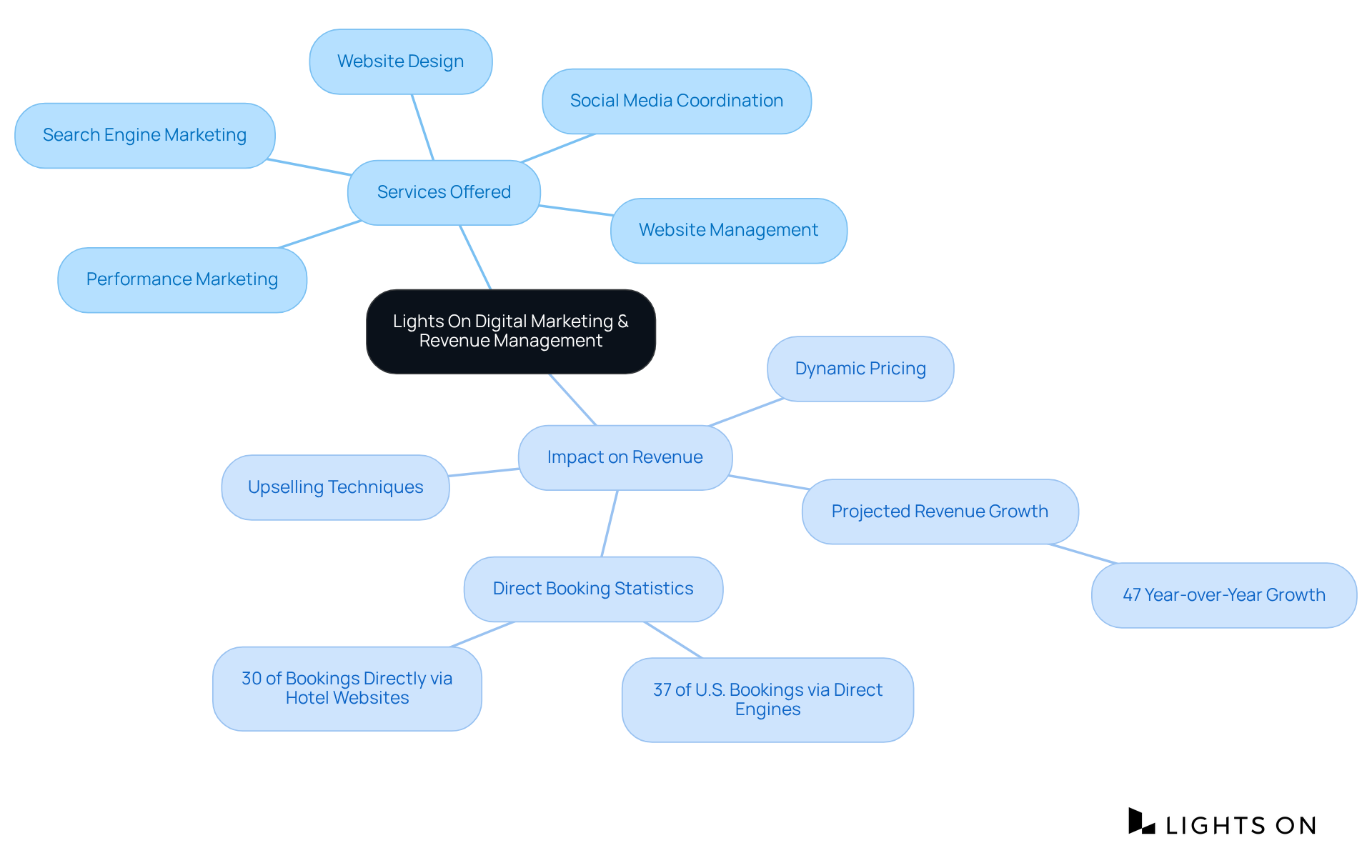
An effective hotel software reservation system is essential for streamlining the booking process for both visitors and hotel staff. By facilitating real-time availability checks, automated confirmations, and straightforward modifications to bookings, these systems greatly enhance the visitor experience.
Industry specialists report that over 75% of travelers prefer platforms that utilize AI to improve their booking experience, a preference that correlates directly with increased customer satisfaction and loyalty. Furthermore, hotel software with a well-integrated reservation system can synchronize with other management tools, ensuring seamless operations and enabling front desk staff to concentrate on delivering exceptional service.
This integration not only boosts operational efficiency but also fosters greater customer satisfaction, as streamlined processes lead to quicker responses and personalized interactions. As accommodations gear up for 2025, the benefits of automated reservation systems will become increasingly evident, with enhanced visitor experiences cultivating loyalty and repeat reservations.
To optimize your reservation system, consider investing in that can analyze guest data and preferences, ultimately customizing the booking experience to meet individual needs.
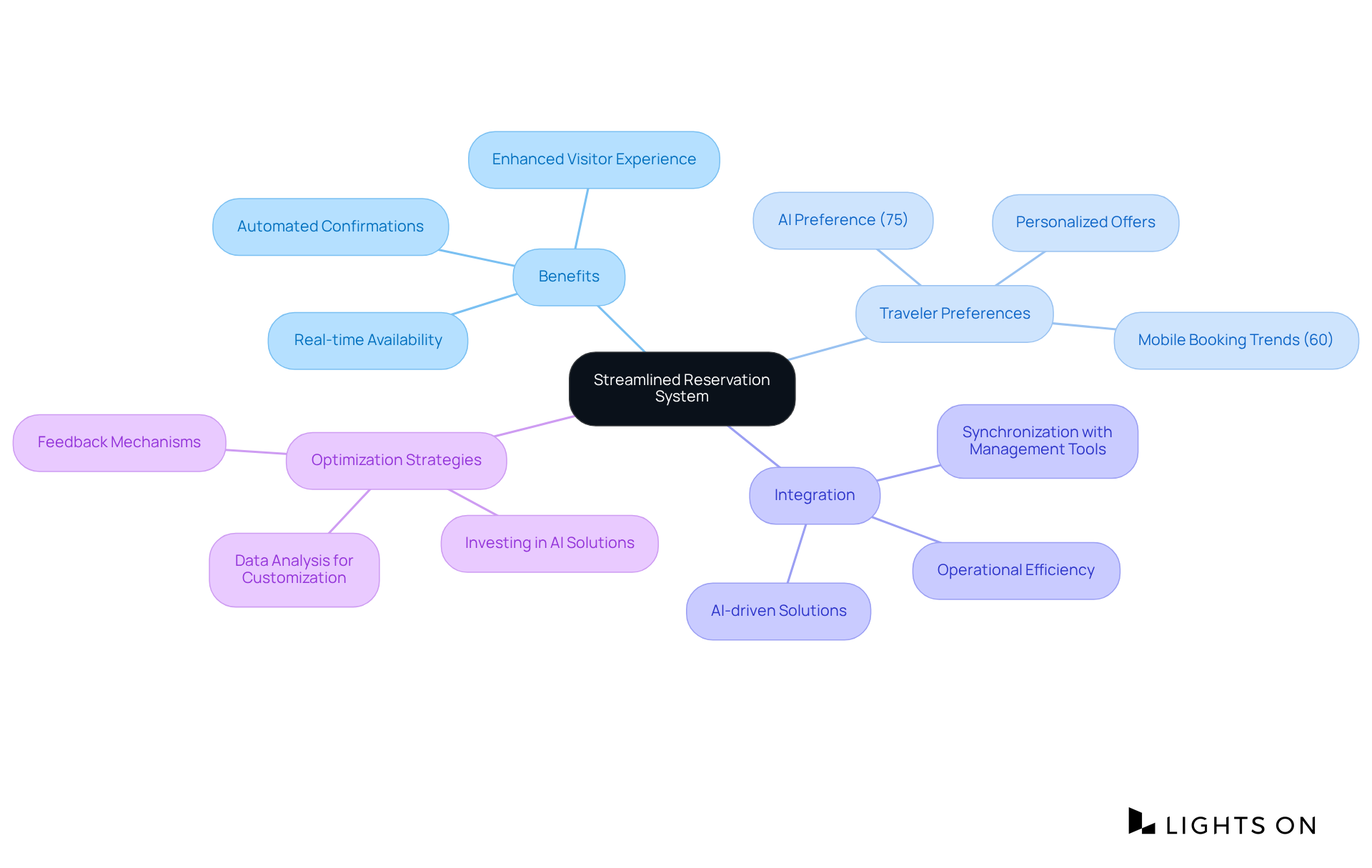
Hotel software for channel management is essential for establishments aiming to distribute their inventory effectively across various OTAs and booking platforms. By automating updates to room availability and pricing, hotels can enhance their distribution strategies, reaching a wider audience while significantly mitigating the risk of overbooking. This technology not only aids in maintaining but also boosts profit potential.
As we look toward 2025, the hospitality industry’s increasing reliance on hotel software will make effective distribution strategies vital for capturing market share and optimizing revenue streams. Industry leaders stress that leveraging real-time data and analytics is critical for understanding booking trends and making informed decisions.
Effective strategies involve the integration of hotel software that provides seamless synchronization of rates and availability, enabling accommodations to respond swiftly to market demands. As the landscape evolves, it is imperative for accommodations to prioritize these tools to remain competitive and enhance profitability.
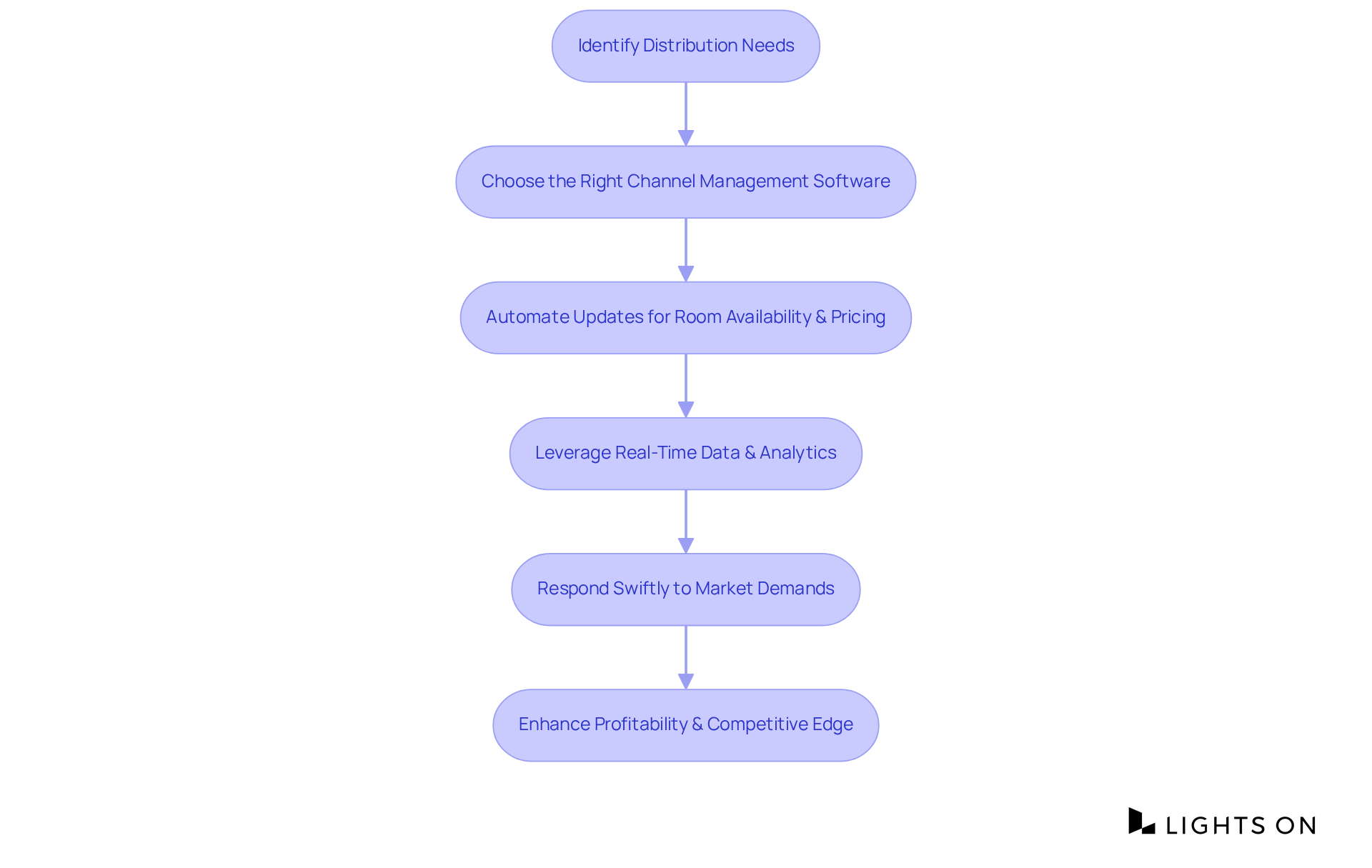
Hotel software integrates revenue management systems that harness data analytics to implement dynamic pricing strategies, adeptly adjusting room rates based on real-time demand, seasonality, and competitor pricing. By scrutinizing historical data and market trends, accommodations can refine their pricing to optimize occupancy and revenue. This proactive approach empowers accommodations to seize peak demand periods while remaining competitive during slower times. Notably, dynamic pricing can yield a remarkable 36% when automated systems adjust prices, compared to a mere 2% increase with human intervention.
As Michael McCartan, EMEA Vice President at IDeaS, asserts, the closed-loop, real-time updating of prices ensures that accommodations are strategically positioned to seize valuable income opportunities. Additionally, this strategy aids accommodations in effectively managing staffing shortages and adapting to market shifts. Furthermore, employing 'what-if' analysis scenarios within hotel software enables revenue managers to simulate the impacts of price changes prior to implementation, thereby enhancing decision-making.
Looking ahead to 2025, the integration of advanced analytics and AI-driven insights is set to further revolutionize accommodation pricing strategies, facilitating more precise adjustments that bolster profitability and elevate guest satisfaction.
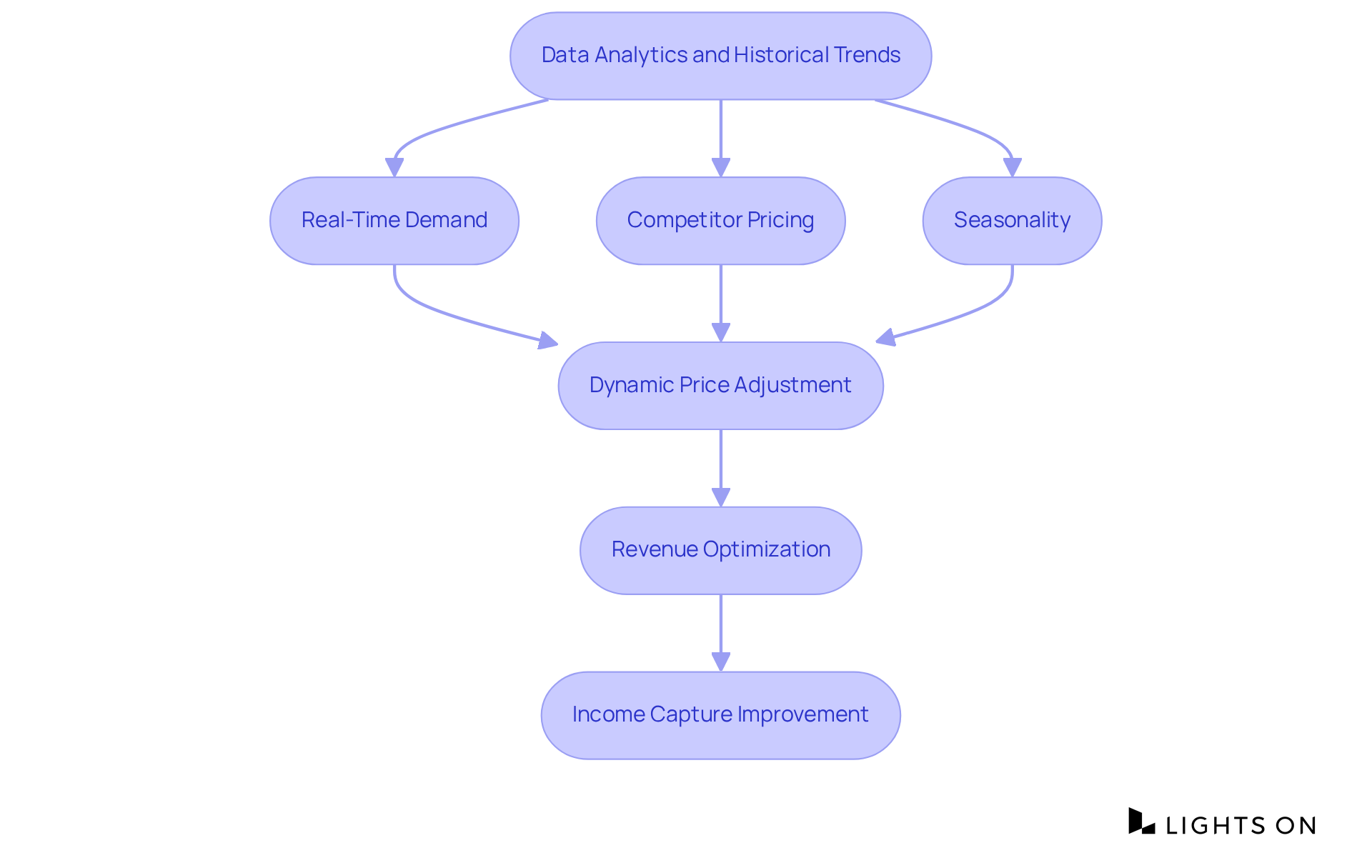
Strong reporting and analytics tools in hotel software are vital for managers, providing essential insights into operational performance. By meticulously tracking key performance indicators (KPIs) such as occupancy rates, average daily rates, and revenue per available room (RevPAR) with hotel software, establishments can make informed decisions that significantly enhance profitability. For instance, those that utilize data-informed insights can pinpoint underperforming areas and modify their marketing strategies accordingly, ultimately drawing in more visitors.
In 2025, the significance of hotel software analytics in accommodation management cannot be overstated; it enables managers to foresee market trends and visitor preferences, ensuring a competitive advantage. To boost reservations, accommodations should consider executing grounded in data insights. Engaging potential clients through social media platforms and providing personalized promotions that address specific customer segments are effective strategies.
As observed by industry experts, the effective application of hotel software for data analytics is crucial for guiding strategic decisions that result in enhanced visitor experiences and operational efficiency. By concentrating on these KPIs and incorporating marketing strategies, establishments can not only enhance their revenue streams but also cultivate long-term customer loyalty, which is increasingly crucial in today's hospitality environment.
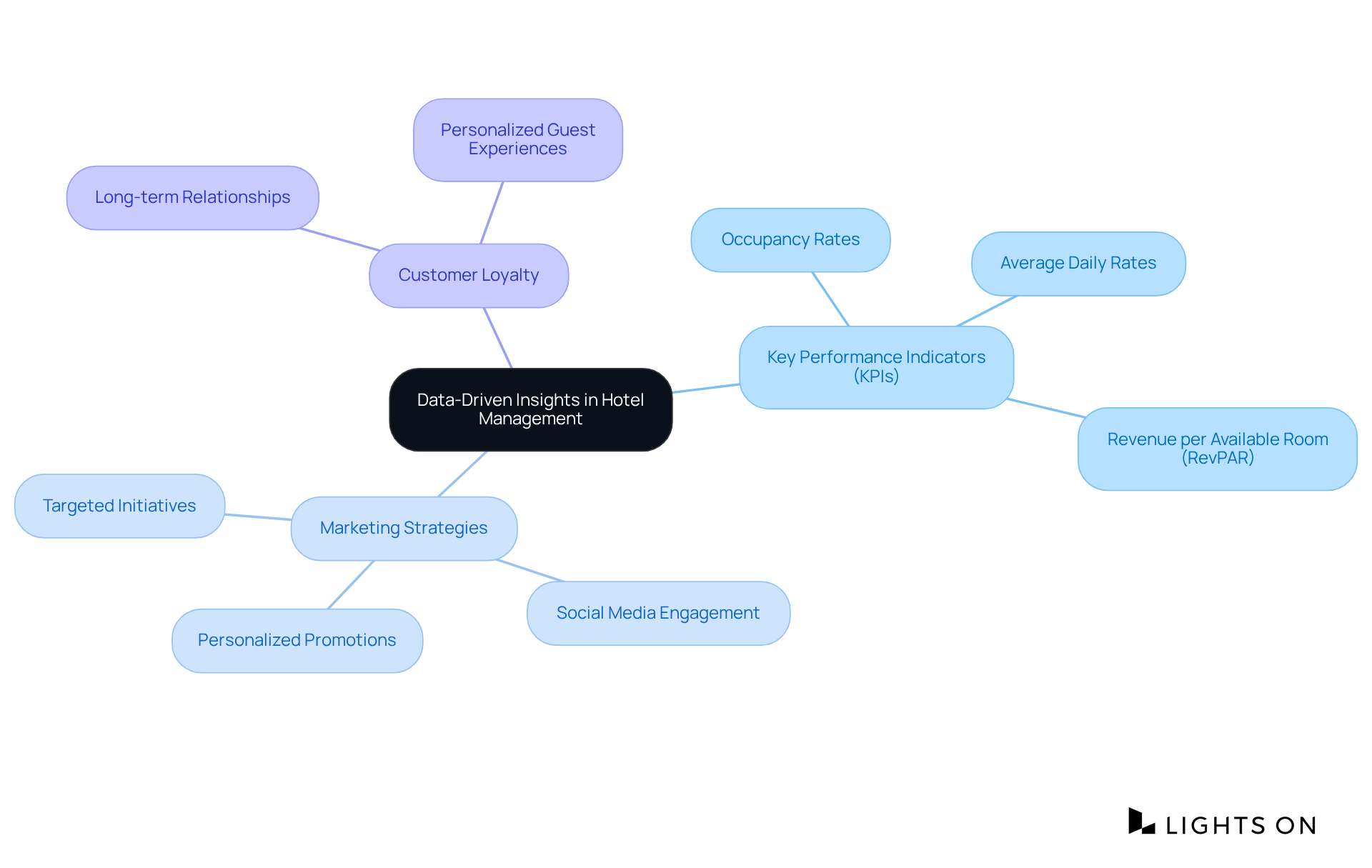
A hotel software system for Customer Relationship Management (CRM) is essential for establishments aiming to enhance visitor interaction and loyalty. By meticulously monitoring visitor interactions, preferences, and feedback, accommodations can leverage this data to craft tailored experiences that meet individual needs, significantly boosting satisfaction and loyalty. For instance, accommodations utilizing CRM data can create hyper-personalized offers, thereby increasing the efficacy of their loyalty programs. AI-driven CRM systems can automate personalized suggestions for room configurations and dining options, ensuring that visitors feel valued and understood.
Furthermore, effective hotel software enables targeted marketing initiatives, allowing hotels to maintain engagement with past visitors and encourage repeat bookings. This strategy is vital, as contemporary travelers anticipate . As industry experts assert, "In hospitality’s new normal, comprehensive visitor loyalty strategies are essential." The transition towards hotel software for technology-driven visitor management is not just a trend; it is a necessity for cultivating emotional connections and loyalty.
To enhance the efficiency of CRM systems, property owners should consider implementing specific strategies, such as:
By 2025, the impact of CRM systems on visitor engagement is expected to be profound, with establishments employing advanced analytics to refine their strategies. By recognizing and rewarding visitors throughout their journey, accommodations can forge lasting connections that lead to increased revenue. The adoption of real-time feedback tools and AI-driven sentiment analysis empowers establishments to promptly address guest concerns, averting negative reviews and improving overall guest satisfaction.
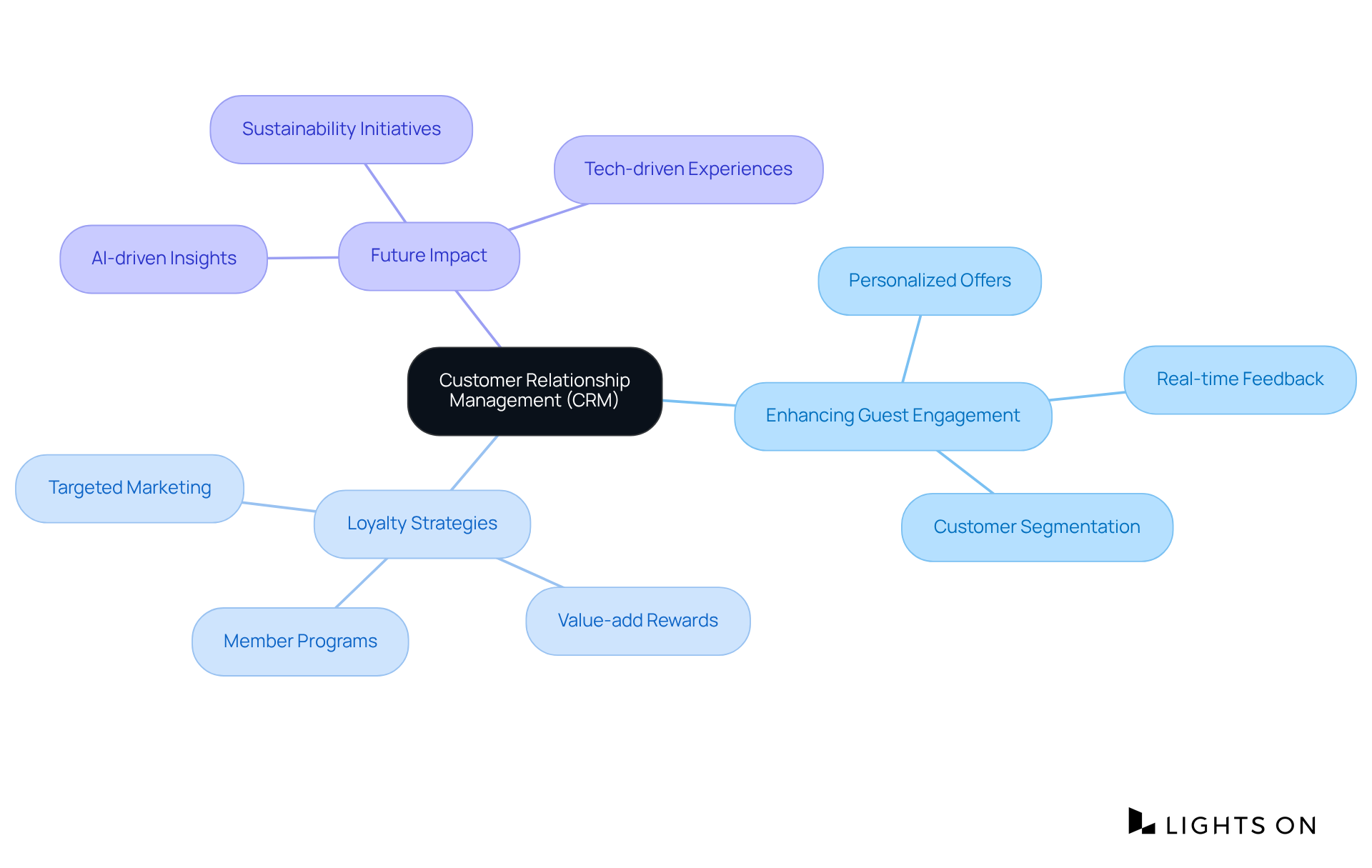
Hotel software for housekeeping management is essential for optimizing the scheduling and monitoring of cleaning tasks, ensuring that accommodations maintain the highest cleanliness standards. By automating task assignments and providing real-time updates, hotel software can significantly boost operational efficiency for accommodations. This automation not only minimizes the likelihood of overlooked rooms and unprepared visitor check-ins but also fosters between housekeeping and the front desk, reducing misunderstandings that could lead to negative visitor experiences.
In 2025, the integration of smart housekeeping devices, such as robotic floor cleaners and AI-powered scheduling systems, along with hotel software and mobile applications, is revolutionizing how hotels manage their cleaning operations. These advanced technologies enable staff to receive real-time notifications when visitors check out, ensuring prompt cleaning without delays. Furthermore, mobile access allows housekeepers to view, update, and close tasks directly from their devices, enhancing accountability and efficiency.
The impact of efficient housekeeping on visitor satisfaction cannot be overstated. A tidy and well-maintained environment is crucial for fostering favorable visitor experiences, which directly influences an establishment's reputation and returning clientele. As visitors increasingly prioritize hygiene, establishments that effectively communicate their housekeeping efforts can enhance their appeal and reassure potential guests about their commitment to cleanliness. Notably, 64% of accommodation operators reported a shortage of available labor, underscoring the necessity for effective hotel software management solutions in the current market.
Experts in hospitality operations stress the importance of simplifying processes for housekeeping teams by utilizing hotel software. Audrey MacRae, Vice President at Maestro PMS, asserts, "The best way to empower your housekeeping team is to strip away the complexity throughout their day and consolidate all of their operations into one PMS dashboard." By adopting this strategy and utilizing hotel software, accommodations can empower their staff, streamline workflows, and ultimately elevate service quality. This approach not only benefits the well-being of cleaning workers but also enables accommodations to meet the growing guest expectations for cleanliness and service speed. Moreover, as data privacy becomes increasingly significant in the cleaning sector, safeguarding sensitive customer information is vital for contemporary housekeeping.
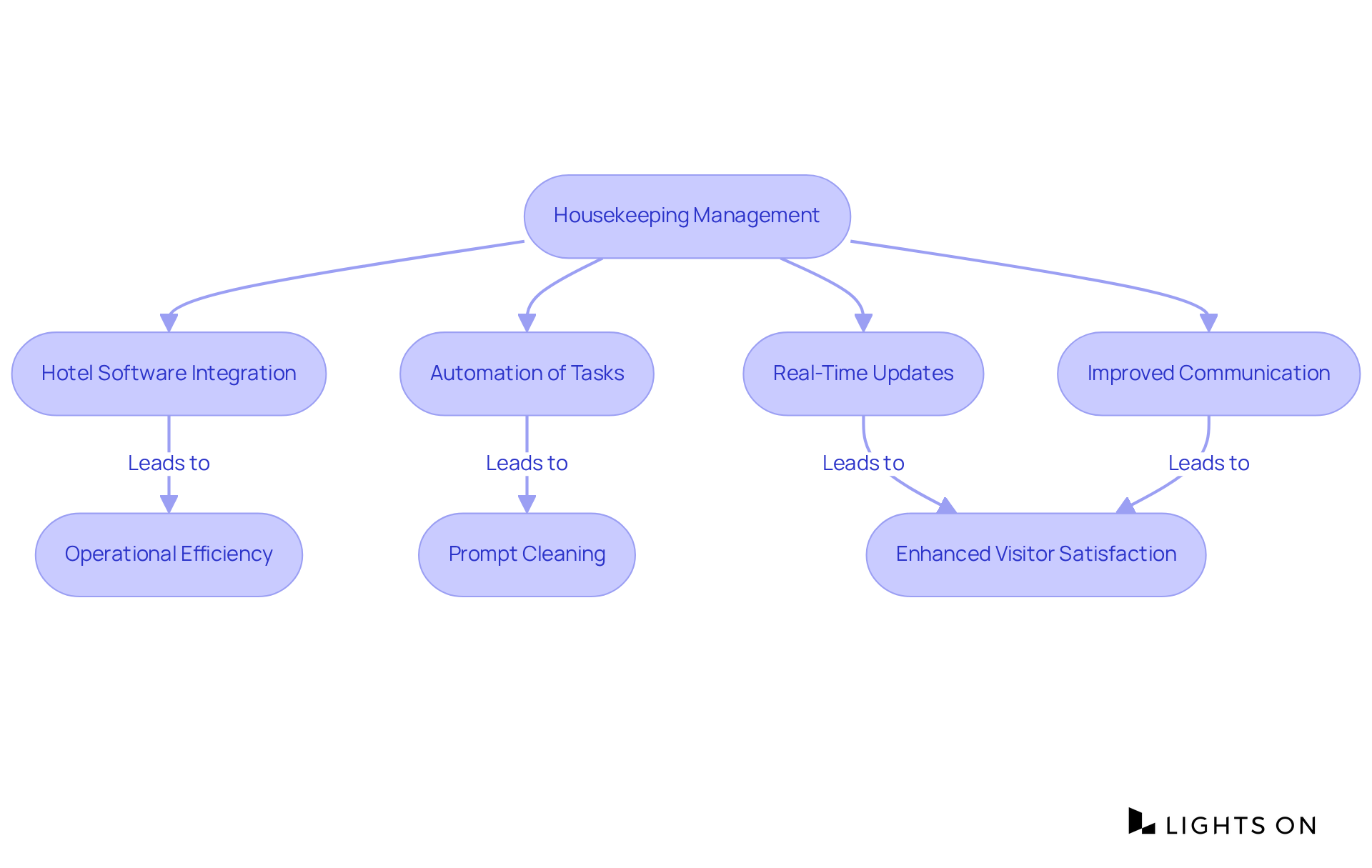
Integration features are essential for accommodations, enabling them to link their property oversight systems (PMS) with their hotel software and numerous third-party applications, such as payment processors, marketing tools, and customer service platforms. This seamless connectivity significantly enhances by automating data transfers and reducing manual input. This improvement is particularly crucial, given that 80% of accommodations spend up to two days a week on manual reporting. Such a statistic underscores the urgent need for automation through integration to alleviate the burden of manual tasks.
Furthermore, customizable integrations empower accommodations to tailor their software solutions to meet specific operational requirements, ensuring adaptability in the ever-evolving landscape of hospitality management. As we approach 2025, the importance of software integration is set to escalate, with experts predicting that 99% of hoteliers will increasingly rely on technology to optimize operations and enhance customer experiences.
By leveraging third-party applications, hotels can further boost their operational efficiency, ultimately leading to improved visitor satisfaction and increased revenue. As technology expert Jordan Hollander aptly states, "Improving operational efficiency is technology’s most important value proposition," underscoring the pivotal role of integration in achieving this objective.
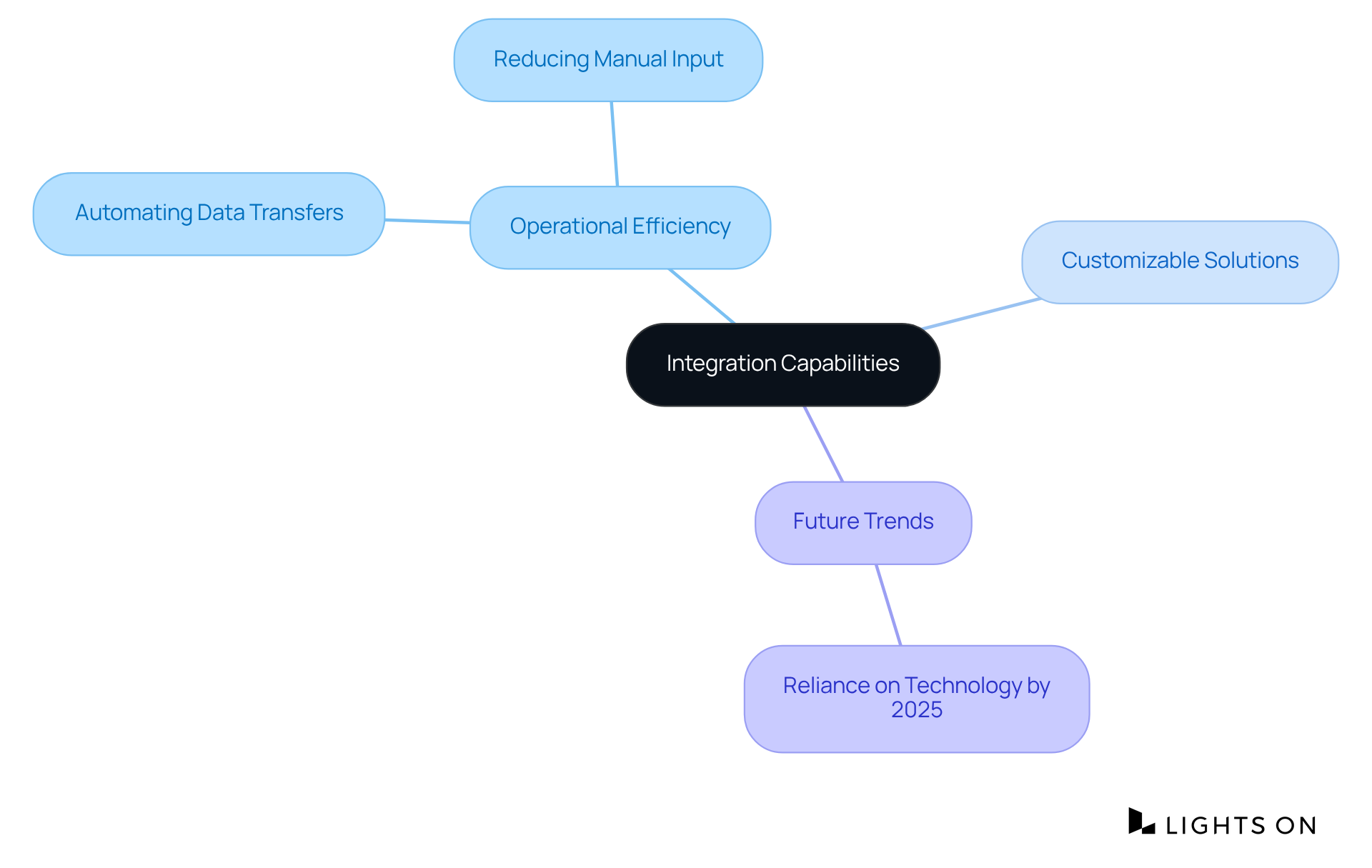
Mobile and contactless operations, such as mobile check-in/check-out and digital room keys, significantly elevate the visitor experience by providing unmatched convenience and reducing physical contact. These technologies empower guests to directly from their smartphones, resulting in heightened satisfaction and improved operational efficiency. For instance, the typical accommodation can save at least 6 minutes per digital check-in and 4 minutes per checkout, allowing staff to dedicate more time to delivering exceptional service. Furthermore, automation in hospitality operations can reduce labor costs by 15-30%, underscoring the broader financial benefits of adopting these technologies.
As the hospitality industry progresses, embracing contactless solutions is becoming imperative. A recent survey indicates that 76% of visitors are more likely to return to venues offering a fully contactless experience, showcasing the importance of these technologies in fostering customer loyalty. Experts assert that each milestone achieved in contactless operations not only enhances convenience but also cultivates trust and boosts customer engagement. As Tristan Gadsby notes, these milestones serve as a foundation for a technological evolution that can aid establishments in transforming their operations and enriching the visitor experience.
Looking ahead to 2025, the momentum towards contactless operations is expected to accelerate, with accommodations increasingly leveraging technology to streamline processes and enhance guest experiences. By adopting hotel software solutions, establishments can not only meet the evolving expectations of travelers but also unlock new avenues for revenue generation and operational efficiency. Moreover, 80% of travelers are willing to pay a premium to stay at a venue that offers seamless, tech-enabled experiences, highlighting the essential need for accommodations to embrace these innovations.
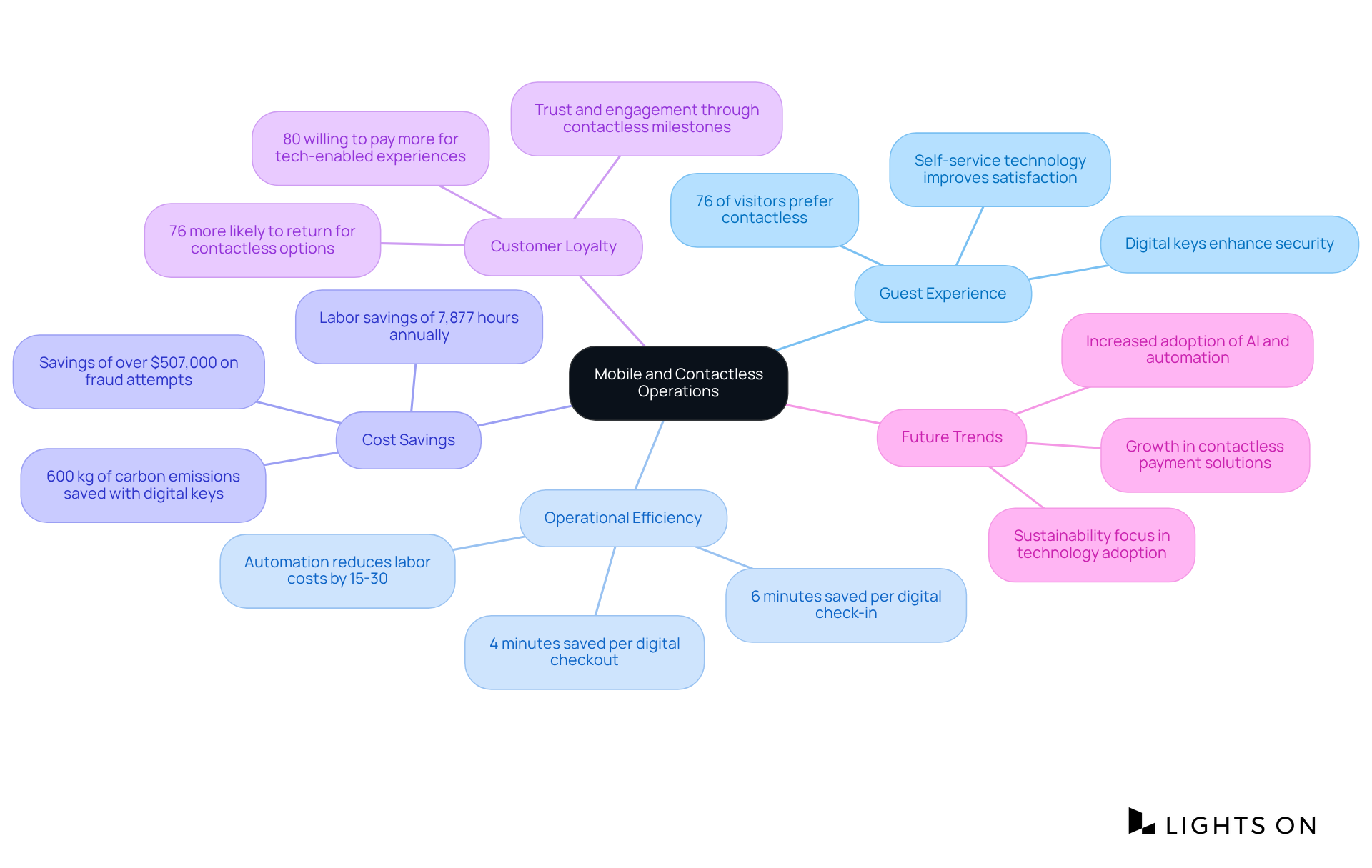
A user-friendly interface in hotel software is crucial for streamlining staff navigation, enabling quick and efficient task execution. An intuitive design significantly reduces the learning curve for new employees, allowing them to reach productivity levels faster. By minimizing complexity, accommodations can enhance operational efficiency, ensuring that staff can devote more time to delivering outstanding customer service.
As noted by Olena Ciftci, Ph.D., "A well-designed UI and UX enhances staff efficiency by reducing the time required to perform tasks, minimizing errors, and ultimately improving employee satisfaction and reducing employee turnover."
Furthermore, with 38% of employees citing their experience with the PMS as influential in their decision to leave their jobs, the importance of such intuitive design cannot be overstated. In 2025, as today's hotel guests expect at every touchpoint, the impact of user-friendly software on hotel performance and guest satisfaction becomes increasingly critical.
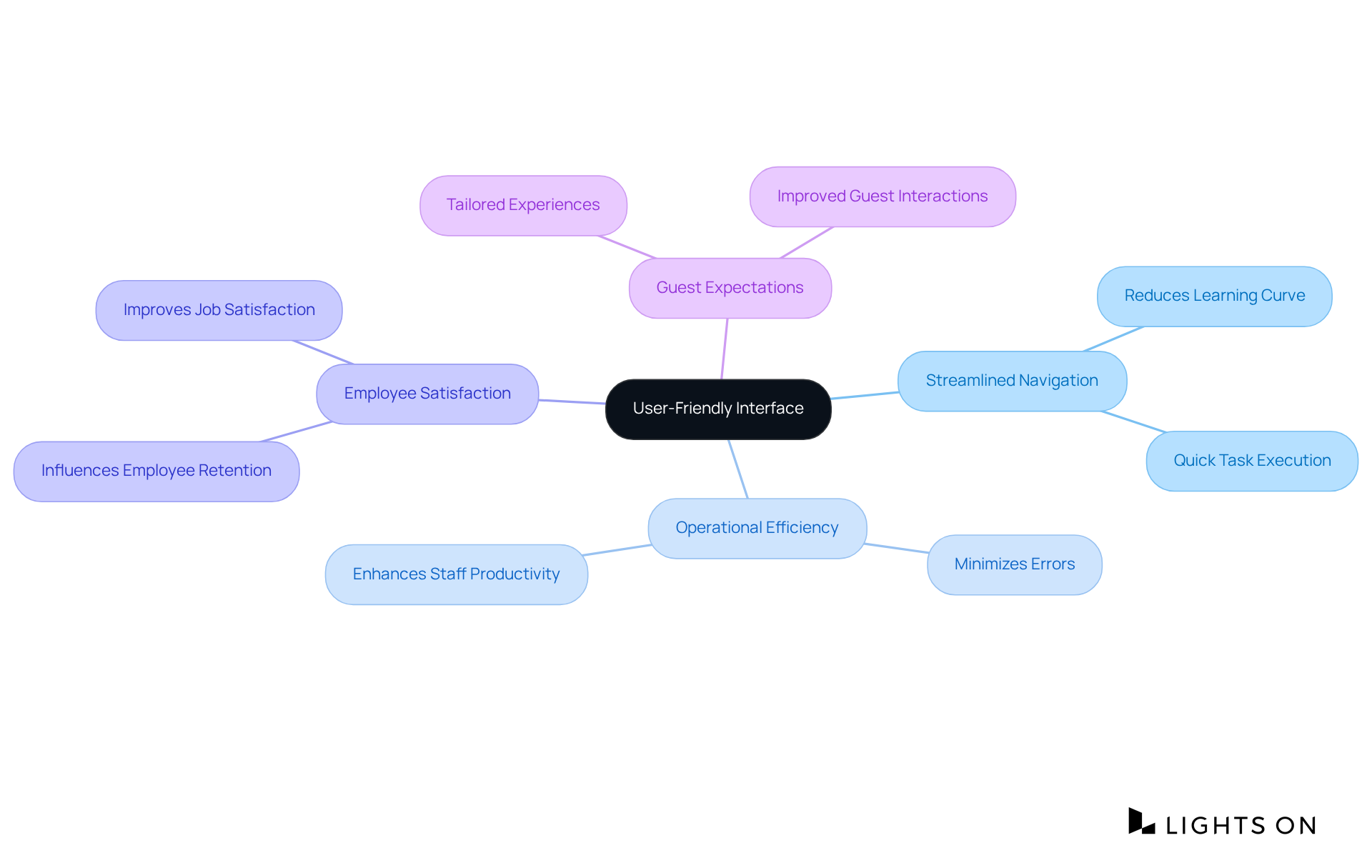
In the realm of hospitality management, the integration of advanced hotel software features is essential for optimizing operations and enhancing guest experiences. This article highlights the importance of various functionalities, from comprehensive digital marketing and revenue management services to user-friendly interfaces that streamline staff navigation. Emphasizing the need for adaptability and efficiency, these features collectively empower accommodations to meet the evolving expectations of travelers while maximizing profitability.
Key insights discussed include:
As the hospitality industry gears up for 2025, embracing these essential features of hotel management software will be crucial for establishments seeking to thrive in a competitive landscape. By investing in technology that enhances operational efficiency and prioritizes guest satisfaction, hotels can not only attract new clients but also cultivate lasting relationships with returning guests. The future of hospitality lies in the ability to adapt and innovate, making the adoption of these software features not just beneficial, but imperative for success.
What services does Lights On provide for the hospitality sector?
Lights On offers a wide range of digital marketing and revenue management services, including website and content management, performance marketing, social media coordination, search engine marketing, website design, and advanced income management strategies like pricing optimization and demand generation.
How do Lights On's strategies impact hotel revenue?
Successful case studies show that accommodations using dynamic pricing and upselling techniques can see significant increases in additional income and guest loyalty. Implementing these strategies with hotel software is projected to improve performance metrics and increase direct bookings.
What statistics highlight the effectiveness of Lights On's services?
Establishments that use hotel software along with comprehensive revenue management strategies can achieve up to 47% year-over-year revenue growth. Additionally, 37% of U.S. accommodation reservations now come from direct booking engines, emphasizing the need for optimized pricing and visibility.
What is the importance of a comprehensive approach in hospitality marketing?
Experts emphasize that a holistic approach integrating revenue management with marketing initiatives is crucial for creating personalized guest experiences that drive bookings and enhance satisfaction, especially as customized experiences are expected to remain central to effective strategies by 2025.
Why is an effective hotel software reservation system important?
An effective reservation system streamlines the booking process for guests and hotel staff by allowing real-time availability checks, automated confirmations, and easy modifications, which significantly enhances the visitor experience and operational efficiency.
What preferences do travelers have regarding booking platforms?
Over 75% of travelers prefer platforms that use AI to improve their booking experience, which correlates with increased customer satisfaction and loyalty.
How does channel management software benefit hotels?
Channel management software helps hotels distribute their inventory effectively across various OTAs and booking platforms by automating updates to room availability and pricing, thereby enhancing distribution strategies and reducing the risk of overbooking.
What role does real-time data and analytics play in channel management?
Utilizing real-time data and analytics is critical for understanding booking trends and making informed decisions, which helps accommodations respond quickly to market demands and optimize revenue streams.
What should accommodations consider for their reservation systems as they prepare for 2025?
Accommodations should consider investing in AI-driven solutions that analyze guest data and preferences to customize the booking experience, enhancing visitor satisfaction and fostering loyalty.
Transform your group booking strategies with Lights On and watch your occupancy soar.